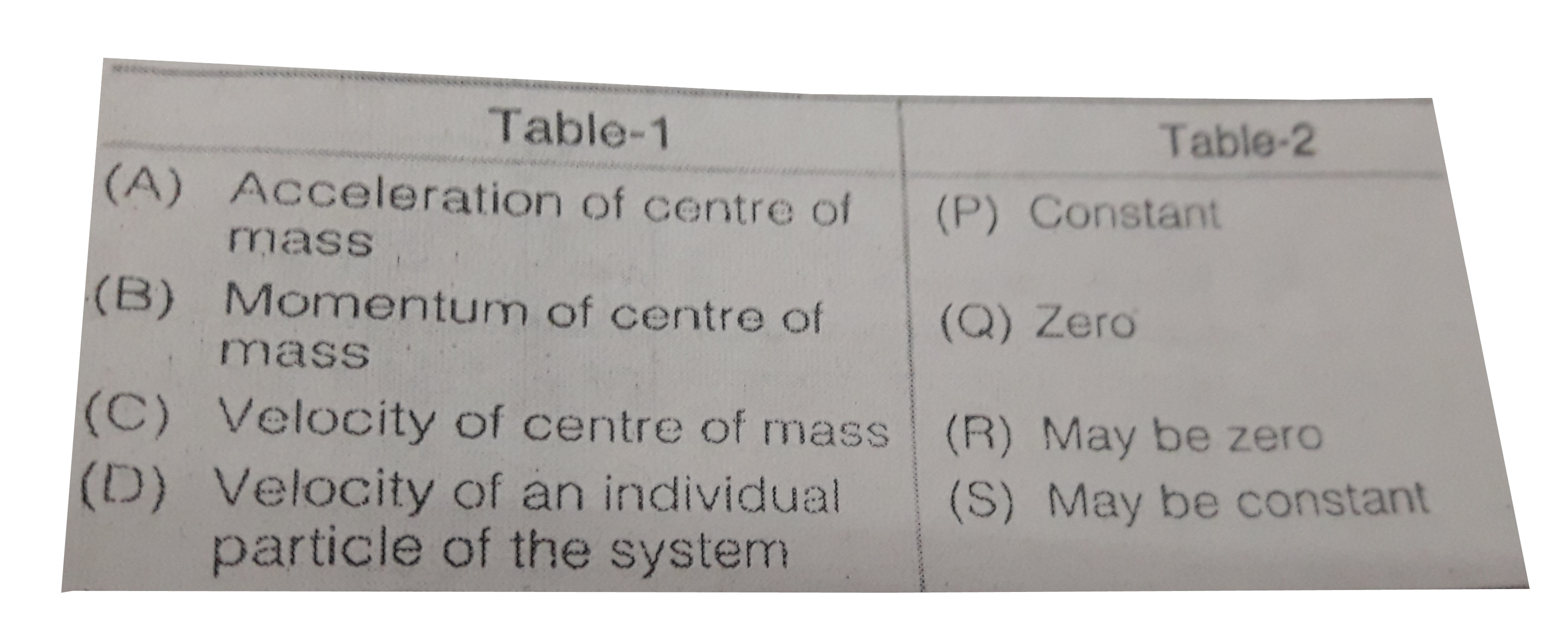Consider the following two statements:
A. Linear momentum of a system of partcles is zero.
B. Kinetic energ of a system of particles is zero.
A implies B and B implies A
A does not imply B and B does not imply A.
A implies B but B does not imply A
B implies A but A does not imply B
The correct Answer is:D
Kinetic energy of the sytem is zero, it definitely means momentum is zero. But momentum of the system is zero, it does not kinetic energy is zero.

Topper's Solved these Questions
- CENTRE OF MASSBOOK - DC PANDEY ENGLISHCHAPTER - CENTRE OF MASSEXERCISE - Assertion and reason
21 Videos
- CENTRE OF MASSBOOK - DC PANDEY ENGLISHCHAPTER - CENTRE OF MASSEXERCISE - Match the coloumns
9 Videos
- CENTRE OF MASSBOOK - DC PANDEY ENGLISHCHAPTER - CENTRE OF MASSEXERCISE - Check points
50 Videos
- CALORIMETRY AND HEAT TRANSFERBOOK - DC PANDEY ENGLISHCHAPTER - CALORIMETRY AND HEAT TRANSFEREXERCISE - Medical entrance s gallery
38 Videos
- CENTRE OF MASS, IMPULSE AND MOMENTUMBOOK - DC PANDEY ENGLISHCHAPTER - CENTRE OF MASS, IMPULSE AND MOMENTUMEXERCISE - Comprehension type questions
15 Videos
Similar Questions
Consider the following two statements:
A. Linear momentum of a system of particles is zero.
B. Kinetic energy of a system of particles is zero.
View SolutionThe angular momentum of a system of particles is conserved
View SolutionConsider the following two statements:
A. linear momentum of the system remains constant.
B. Centre of mass of the system remains at rest
View SolutionConsider the following two statements:
A. Kinear momentum of the system remains constant.
B. Centre of mass of the system remains at rest
View SolutionConsider the following two statements:
A The linear momentum of a particle is independent of the frame of reference.
B. The kinetic energy of a particle is independent of the frame of reference
View SolutionIf net force on a system of particles is zero, then match the following.

View SolutionSuppose we define a quantity Linear Momentum as linear momentum =mass x speed.
The linear momentum of a system of particles is the sum of linear momentum of the individual particles. Can we state a principle of conservation of linear momentum as linear momentum of a system remains constant if no external force acts on it?
View SolutionIf the resultant force on a system of particles is non-zero, then:
View Solutionconsider the following two statements.
(A) If heat is added to a system, its temperature must increase.
(b) if positive work is done by a system in a thermodynamic process, its volume must increase.
View SolutionA bomb, initially at rest, explodes into several pieces. (a) Is linear momentum of the system conserved? (b) Is kinetic energy of the system conserved? Explain.
View Solution
